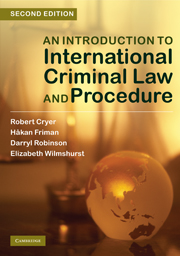Book contents
- Frontmatter
- Contents
- Preface to the Second Edition
- Table of Cases
- Table of Treaties and other International Instruments
- Table of Abbreviations
- PART A INTRODUCTION
- PART B PROSECUTIONS IN NATIONAL COURTS
- PART C INTERNATIONAL PROSECUTIONS
- PART D SUBSTANTIVE LAW OF INTERNATIONAL CRIMES
- 10 Genocide
- 11 Crimes Against Humanity
- 12 War Crimes
- 13 Aggression
- 14 Transnational Crimes, Terrorism and Torture
- PART E PRINCIPLES AND PROCEDURES OF INTERNATIONAL PROSECUTIONS
- PART F RELATIONSHIP BETWEEN NATIONAL AND INTERNATIONAL SYSTEMS
- Index
- References
14 - Transnational Crimes, Terrorism and Torture
from PART D - SUBSTANTIVE LAW OF INTERNATIONAL CRIMES
Published online by Cambridge University Press: 05 June 2012
- Frontmatter
- Contents
- Preface to the Second Edition
- Table of Cases
- Table of Treaties and other International Instruments
- Table of Abbreviations
- PART A INTRODUCTION
- PART B PROSECUTIONS IN NATIONAL COURTS
- PART C INTERNATIONAL PROSECUTIONS
- PART D SUBSTANTIVE LAW OF INTERNATIONAL CRIMES
- 10 Genocide
- 11 Crimes Against Humanity
- 12 War Crimes
- 13 Aggression
- 14 Transnational Crimes, Terrorism and Torture
- PART E PRINCIPLES AND PROCEDURES OF INTERNATIONAL PROSECUTIONS
- PART F RELATIONSHIP BETWEEN NATIONAL AND INTERNATIONAL SYSTEMS
- Index
- References
Summary
Introduction
Overview
To focus only on the ‘core crimes’ and their prosecution would be to ignore a substantial area of criminal law with international implications; there are other crimes of international concern which have a huge impact on people throughout the world and on global economic development. Crimes which are the subject of international suppression Conventions but for which there is as yet no international criminal jurisdiction, are the focus of this chapter. They are here termed ‘transnational crimes’. Like the core crimes, these are crimes which have actual or potential transboundary effect or which are intra-State but which offend a fundamental value of the international community.
The prevention and punishment of transnational crimes requires cooperation among governments and among law enforcement agencies. A growing number of agreements are being concluded to provide for this in relation to such crimes as drugs trafficking, piracy, slavery, terrorism offences, torture, apartheid, enforced disappearances, transnational organized crime including people trafficking, smuggling migrants and illegal arms trafficking, and corruption. Some of these are also covered by customary international law or are international crimes when committed in certain circumstances (for example as crimes against humanity). They include those which were listed as ‘treaty crimes’ in the ILC draft of the ICC Statute, but which were excluded from the Rome Statute in the course of the negotiations.
- Type
- Chapter
- Information
- An Introduction to International Criminal Law and Procedure , pp. 334 - 358Publisher: Cambridge University PressPrint publication year: 2010



